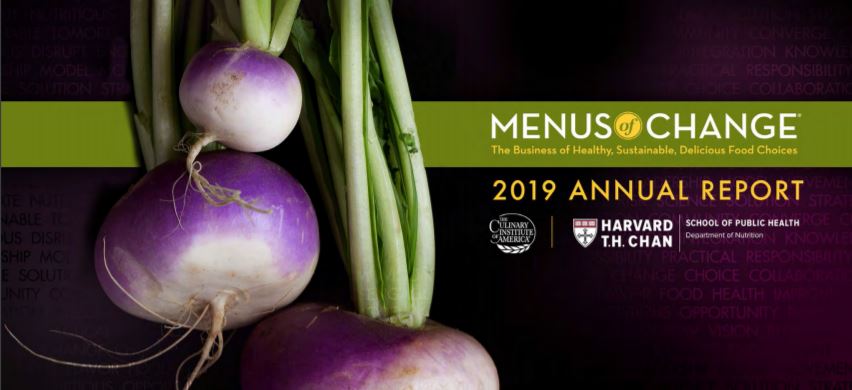Chefs, food companies and foodservice operators are continuing to nudge consumer food choices in a more healthful, sustainable direction, according to the 7th Menus of Change Annual Report. Released yesterday by the Culinary Institute of America and Harvard T.H. Chan School of Public Health—Department of Nutrition to kick off their annual Menus of Change conference, the report details the progress the foodservice industry has made over the past year.
“Overall, as the 2019 Menus of Change Dashboard shows, restaurant and foodservice leaders are making steady progress in their efforts to offer Americans better food choices, while also wrestling with increasingly complex risks from climate change, water scarcity, lack of visibility into supply chains and other environmental factors that make our supply chain more brittle and less predictable,” the report says. “Our industry has shown great innovation in accomplishing this shift, and, importantly, consumers have shown great appetite for such innovation.”
The Menus of Change Dashboard serves as an annual progress report on 12 issues at the intersection of public health, the environment and the business of food. This year’s report points to continued effort in these key areas, but lacks the more dramatic improvement reflected in last year’s report.
“The 2019 report acknowledges that change can require sustained effort before seeing a large payoff,” the report states. “Scores for the majority of the essays in the report held steadfast in the past year, albeit with progress noted for fruit and vegetable consumption.”
Plant-forward moves forward
On the issue of fruit and vegetable consumption and production, the foodservice industry has shown “good progress, with room for more,” over the past 12 months.
“While consumptive data does not yet show an increase in fruit and vegetable consumption, interest among trend-leading chefs, large non-commercial foodservice operators, and their customers in plant-forward menus— including fruits and vegetables—is surging,” the report says.
Chefs and food companies are creating delicious, exciting dishes made mostly or entirely from plants that are driving interest in plant-based eating among consumers. Plant-forward offerings from mainstream food brands and fast casual concepts (like those identified on the QSR-CIA Plant-Forward Fast Casual Watch List) are making plant-based eating more accessible and achievable for a wider swath of US consumers.
Artists and influencers are also helping inspire more people to take up healthier, more plant-centric eating habits, Afya Ibomu said in a panel discussion at the Menus of Change conference. The nutritionist and author co-founded a lifestyle company with her husband called RGB Fit Club that aims to inspire a healthy lifestyle built around fitness and plant-based eating. She pointed to examples such as DJ Khaled’s campaign with Silk Almondmilk and Beyoncé and Jay-Z’s advocacy for veganism as successful efforts to make plant-based eating relevant and attractive to consumers who may not have previously given much thought to a plant-based diet.
Ibomu also noted the power of meat alternatives such as Impossible Burger and the Beyond Burger to encourage consumers to make the switch from animal protein. However, she and other panelists were careful not to overpraise these alternative meats since they are costly and not as nutritionally sound as some other plant-based foods. Walter Willet of the Harvard T.H. Chan School of Public Health likened the meat facsimiles to a nicotine patch, saying they can help US diners break their reliance on red meat.
“The vast amount of attention, innovation and investment happening in this sector is cause for hope that consequential shifts are on the horizon,” the Menus of Change report said of the plant-based protein category.
Progress toward water sustainability is just a drop in the bucket
While the progress made toward greater produce consumption is a bright spot in this year’s Menus of Change report, water sustainability is one of the areas that needs the most attention in the years to come. Water sustainability is the only one of the dozen issues tracked by Menus of Change that hasn’t seen any improvement in its score over the past four years. Since the 2015 report, the score for water sustainability has been holding steady at “getting better, but far from where it needs to be.”
“From recipe design to equipment to food sourcing (including a greater emphasis on plant-based ingredients), the foodservice industry has many opportunities to adopt innovative solutions to reduce the water footprint of its menus and within its operations,” this year’s report says.
Agriculture is the single largest consumer of fresh water, but choosing crops that use less water is one way to advance water sustainability. Millet uses one-tenth of the water that wheat or rice requires, chef Anahita Dhondy said in a presentation at Menus of Change. She serves the ancient grain in several different ways at her restaurant in New Delhi, SodaBottleOpenerWala.
Dhondy said chefs play a key role in changing the way consumers eat, and offering healthy, sustainable choices that are also delicious is key to inspiring responsible eating habits that stick.
Related stories:
- What’s next for plant-based brands in a flexitarian world?
- Mindful sourcing: Consumers are becoming more mindful about their food choices
- Plant-based foods, off-premise tech solutions stood out at restaurant show
_____________________________________________________________________________________________________________
If you enjoyed this article, sign up for ProChef Smartbrief, or check out all of SmartBrief’s food and travel newsletters as we offer more than 30 newsletters covering the food and travel industries from restaurants, food retail and food manufacturing to business travel, the airline and hotel industries and gaming.
